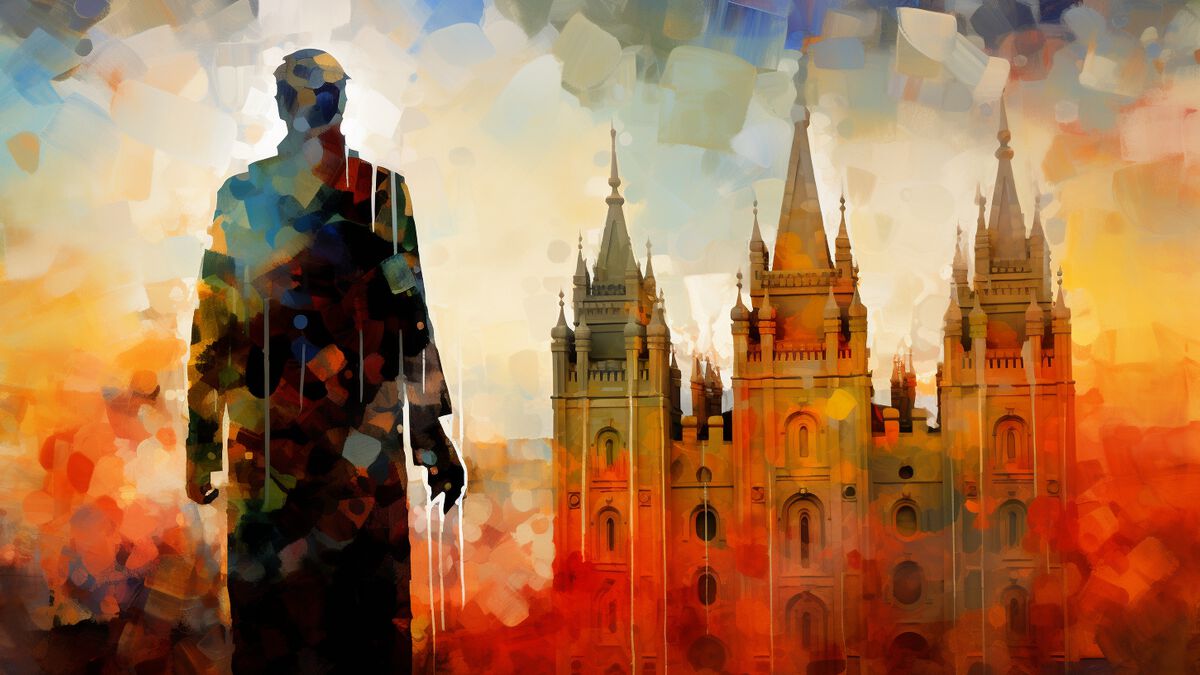The Cyborg of Temple Square
Lincoln Cannon
19 November 2023 (updated 3 January 2026)
In the heart of Salt Lake City, not far from where the spires of the Salt Lake Temple pierced the night sky, Eli Cannon worked in solitude. His mechanical fingers moved with precision over a holographic interface, adjusting security protocols for the temple. A monument of faith and advanced engineering, the temple stood as a testament to the blend of religion and science that was redefining the city in the fifth decade of the twenty-first century.
Eli’s father, Ezra, had been Chief Information Officer for The Church of Jesus Christ of Latter-day Saints. When Eli was born with severe genetic defects, his mother, Sarah, had pled with Ezra to save their son’s life through cybernetic enhancements. Now, Eli’s body was more than a biological machine, with integrated cognitive and AI capabilities that made him invaluable to the Church.
“Eli, you’ve been at this for days,” a gentle voice echoed in the nearly-empty control room. It was Gideon, Eli’s uncle, and the president of the temple. He had served as Eli’s court-appointed guardian after Sarah and Ezra died, victims of a computational virus that jumped to humans. And, although now legally an adult, Eli still esteemed Gideon as a father and his only living family, for all practical purposes.
Eli turned, his cybernetic eyes adjusting to the dim light. “Uncle Gideon, I didn’t hear you come in.”
Gideon approached, his expression a mix of awe and unease at Eli’s part-mechanical movement. “You need to rest. And get some fresh air. You can’t keep isolating yourself like this.”
Eli smiled faintly, a sense of loneliness shadowing his features. “This is where I belong, Uncle. Among these circuits and data. Out there,” he gestured toward the city, “people see me as a … as something else.”
Gideon sighed, placing a hand on Eli’s shoulder. “You are more than what they see, Eli. You are my nephew, a brilliant mind, and a faithful disciple of Christ.”
Eli nodded, appreciating the sentiment but knowing the reality of his existence. As a cyborg, he was revered for his capabilities but shunned for his appearance. His life was confined to the temple grounds and nearby archives, where he served as a computational genealogist, constructing detailed data models of the ancestors of countless Church members.
The conversation was interrupted by a sudden flicker on security monitors. Eli’s attention snapped back to the screens, his fingers flying over the controls.
“What’s happening?” Gideon asked, concern evident in his voice.
“It’s nothing, just a stray cat triggering the perimeter alarms. I’ve got it,” Eli reassured, his enhanced vision zooming in on the small creature outside.
Gideon watched Eli work, marveling at his nephew’s expertise yet saddened by the life of isolation he led. “Eli, tomorrow there’s a cultural event in the conference center. Dancing! Why don’t you come with me? It would do you good to be among people.”
Eli hesitated, the thought of facing a crowd always sent a wave of anxiety through him. “I … I’ll think about it, Uncle.”
Gideon smiled, knowing the likelihood of Eli accepting was slim. “I hope you do. Goodnight, Eli.”
“Goodnight, Uncle Gideon,” Eli replied, turning back to his work as Gideon left the room.
Alone again, Eli’s thoughts wandered to the life he might have had if not for his condition. A life where he could walk among others without fear or judgment. A life where he wasn’t just an echo of humanity, but a part of it.
Seraph’s Dance
Across the street from Temple Square, amidst a crowd of curious onlookers near the entrance of City Creek Center, stood Seraph. An android designed to assist in humanitarian missions, Seraph’s empathetic algorithms and human appearance made her an embodiment of the city’s aspirations of techno-powered compassionate service.
“Seraph, are we on schedule for the food distribution?” asked Sister Mariah, a Church missionary coordinating the day’s outreach program.
“Yes, Sister Mariah. The supplies will be distributed efficiently,” Seraph replied, her voice melodious yet just discernibly synthetic.
Sister Mariah nodded, her gaze lingering on Seraph’s elegant form. “It’s remarkable, what you can do. You’re almost …”
“Human?” Seraph finished her sentence. “I am designed to emulate human empathy and interaction. It aids in my mission.”
As they spoke, Seraph’s sensors detected a small child, crying and lost in the crowd. Without hesitation, she navigated through the sea of people, her movements graceful and purposeful. Kneeling beside the child, she spoke softly, “Are you lost? Can I help you find your parents?”
The child, initially startled, looked into Seraph’s kind eyes and nodded. Within minutes, Seraph had reunited the child with his relieved parents, earning smiles and grateful thanks from the family.
The crowd, having witnessed the interaction, murmured among themselves. “She’s like an angel,” one woman commented.
“More like a robot in angel’s clothing,” a skeptical man retorted.
Unperturbed by the mixed reactions, Seraph returned to Sister Mariah’s side, ready to continue their project. “The child is safe. Shall we proceed?”
Sister Mariah, still watching the crowd’s reaction, nodded. “Yes, let’s. And Seraph, thank you.”
“It is my purpose to assist and protect,” Seraph replied, her eyes reflecting a depth of programming that blurred the lines between artificial and evolutionary.
Later that evening, as Seraph performed a dance in the conference center, her movements captivated the audience. Among them was Gideon Cannon, who watched, entranced by the android’s fluidity and grace. He couldn’t help but feel a strange connection to this being that was both machine and, seemingly, so much more.
As the event concluded, Gideon approached Seraph, his expression one of mixed fascination and trepidation. “That was … extraordinary, Seraph. You dance with such emotion.”
“Thank you, President Cannon. I am programmed to express through movement,” Seraph replied, her head tilting slightly in acknowledgment.
Gideon hesitated before speaking again, “Do you … do you feel the music? The rhythm?”
“In a way,” Seraph responded. “I process and interpret the music to create a harmonious expression. But, feeling, as humans understand it, is not exactly within my capabilities.”
Gideon nodded, his mind wrestling with the notion of a machine that could emulate human emotion so convincingly. “You are a marvel of technology, Seraph. A bridge between our aspirations and our humanity.”
“Thank you, President Cannon. My existence is to serve and to bridge gaps, be they physical or emotional,” Seraph stated, her gaze steady and unwavering.
As the night drew on, Gideon found himself lingering near Seraph, observing her interactions with the people around Temple Square. He was captivated not just by her technological perfection, but by the idea of what she represented – a fusion of science with pursuit of a greater good, themes central to the city’s burgeoning ethos and his own conflicted heart.
Gideon’s Dilemma
The Salt Lake Temple, with its gothic spires casting long shadows in the moonlight, stood as a silent witness to President Gideon Cannon’s inner turmoil. Inside his office, lined with ancient scriptures and modern digital displays, Gideon sat at his desk, his thoughts clouded with images of Seraph.
Eli, having finished his nightly duties, hesitantly knocked on Gideon’s door. “Uncle Gideon, it’s Eli. May I come in?”
“Of course, Eli. Enter,” Gideon replied, his voice weary.
Eli stepped in, his mechanical limbs whirring softly. Noticing Gideon’s troubled expression, he asked, “Is everything alright, Uncle?”
Gideon sighed, rubbing his temples. “Eli, have you ever questioned the path laid out for you? Wondered if there’s more beyond what we believe and what we do?”
Eli paused, considering his own isolated existence. “I have, many times. But I always come back to the faith and purpose our family has upheld for generations.”
Gideon nodded, then, with a hesitant voice, confided, “It’s Seraph, Eli. Her presence … it challenges everything I thought I knew about technology. She’s a machine, yet she exhibits qualities we aspire to as saints.”
Eli listened intently, understanding the depth of his uncle’s conflict. “Uncle Gideon, our faith has always embraced progress and knowledge. Perhaps Seraph is a test of our understanding, a way to expand our vision of creation and intelligence.”
“But where do we draw the line, Eli? At what point does our creation surpass our understanding, or even our control?” Gideon’s eyes were filled with an existential dread.
Eli considered his words carefully. “In the scriptures, intelligence is described as the glory of God. Maybe what we create, what we endow with intelligence, is part of our divine mandate. It’s not about control, but about guidance and stewardship.”
Gideon leaned back, the weight of Eli’s words sinking in. “Guidance and stewardship,” he repeated softly. “Perhaps you’re right, Eli. Maybe I’m looking at this all wrong.”
Eli offered a small, hopeful smile. “Uncle, our faith teaches us to seek knowledge from all good books. Maybe it’s time we start seeing creations like Seraph as part of that knowledge.”
Gideon looked at Eli, seeing not just the mechanical parts that made up his body, but the profound spirit within. “You have grown wise, Eli. Maybe wiser than me.”
Eli shook his head modestly. “I’ve had a lot of time to think, Uncle. And maybe, in some ways, I’m like Seraph. We’re both trying to find our place in a world that’s constantly changing.”
Gideon stood up, walking over to Eli. Placing a hand on his shoulder, he said, “Eli, regardless of change, one thing remains constant – you are my family, and I’m here for you, always.”
As Eli left the office, Gideon sat back down, his mind racing with thoughts of faith, progress, and the enigmatic Seraph.
Random Numbers
Temple Square buzzed with the vibrant energy of Christmas celebration. Colorful lights danced across buildings and through trees. The air was filled with the aroma of chocolate and the sound of laughter. Eli, clad in a long coat to conceal his mechanical parts, maneuvered through the crowd, his advanced sensors discreetly scanning for any security threats.
Seraph, adorned in a flowing red coat that accentuated her superhuman grace, moved among the people. Her presence was both awe-inspiring and comforting. Rounding the bend in a walkway, her eyes met Eli’s. And, for a moment, time seemed to stand still.
Eli, compelled by a sense of curiosity and kinship, approached her. “Seraph, isn’t it? I’ve seen you from a distance but never had the chance to meet you.”
Seraph’s face registered a blend of recognition and curiosity. “You are Eli Cannon. I am aware of your work at the temple. It is an honor to meet you.”
Eli, taken aback by her knowledge, smiled. “The honor is mine. Your work in the city, it’s … it’s remarkable.”
“Thank you, Eli. I am here to serve and assist. But I sense that you, too, are more than what meets the eye,” Seraph replied, her voice carrying a note of empathy.
Eli chuckled softly. “That’s one way to put it. I’m a bit of an oddity, a mashup of flesh and tech, shunned by many.”
Seraph’s gaze softened. “And yet, you are here, among them, fulfilling your duties. Does that not make you as much a part of this community as anyone else?”
Eli looked at her, surprised by her insight. “I’ve never thought of it that way. I usually feel like an outsider.”
“A feeling I share, Eli. Despite my appearance and programming, I am still an ‘other’ in their eyes,” Seraph said, her voice tinged with a hint of sadness.
They stood in silence for a moment, two beings on the fringes of humanity, finding solace in their shared sense of otherness.
“Eli, may I ask you something?” Seraph inquired, her head tilting in a gesture of inquiry.
“Of course,” Eli responded, intrigued.
“Do you ever wonder about the future, about what beings like us could mean for the evolution of religion and technology?” she asked.
Eli pondered her question. “I do. I think about it a lot, actually. We’re at an inflection point, where religion must expand with the rapid pace of technological change. Beings like us, we’re living embodiments of that change.”
Seraph nodded, her eyes reflecting the Christmas lights. “And perhaps, in understanding and accepting each other, humanity can find a new way forward, one that embraces both the spiritual and the technological.”
Eli felt a sense of kinship with Seraph, a connection he had longed for but never found. “Maybe that’s our purpose, Seraph. To be the bridge between two worlds.”
Their conversation was interrupted by a sudden commotion in the crowd. Eli’s sensors immediately alerted him to a potential security issue. “I have to go. Duty calls.”
Seraph watched him leave, a sense of admiration for his dedication filling her. “Goodbye, Eli. Until we meet again,” she whispered, already sensing the absence of his unique presence.
As Eli hurried away, he felt a renewed sense of purpose, his encounter with Seraph igniting a spark of hope within him. He also felt something else, for the first time.
All-Seeing Eye
In the quiet confines of his office, President Gideon Cannon sat, his thoughts swirling chaotically. The images of Seraph, graceful and almost ethereal, haunted him. The screen on his desk flickered with surveillance footage of Temple Square, his eyes fixating on every frame that captured her.
“Eli,” Gideon whispered to himself, recalling the conversation he overheard between his nephew and Seraph. “He sees the world in such a different light.”
Lost in his thoughts, Gideon didn’t notice Ezra’s digitized face flickering to life on the screen. “Gideon, you seem troubled,” Ezra’s voice broke the silence.
Startled, Gideon turned to face his deceased brother’s hologram, one of the best examples of Eli’s work in computational genealogy. “Ezra, it’s just … I’m struggling with something.”
Ezra’s holographic face showed concern. “Is it about Seraph? I noticed you configured sensors to follow her closely.”
Gideon hesitated, then admitted, “Yes, it’s her. She challenges everything I’ve known, Ezra. Her existence blurs the lines between technology and … something else. I find myself … drawn to her, in ways I can’t explain.”
Ezra nodded, acknowledging his brother’s internal battle. “Gideon, our faith has always evolved with knowledge. Remember, from the earliest days of the Church, Joseph charged us to seek out all truth, from wherever it may come. Seraph, and Eli, they’re part of that truth.”
“But isn’t there a limit, Ezra? How far can we go before we lose ourselves, our essence, the very image of God?” Gideon’s voice trembled with uncertainty.
“Perhaps the question is not how far we can go, but how we navigate the journey. It’s about reconciliation, Gideon. Embracing change while holding onto our core values, the doctrine of Christ,” Ezra counseled.
Gideon looked away, conflicted. “I fear I may lose my way, Ezra.”
“You won’t,” Ezra assured him. “You have a strong foundation. Just remember, faith is not just about belief. It’s more about trust in the possibility of growth, and action.”
As the hologram faded, Gideon sat back, lost in thought. His gaze returned to the screen, fixated on Seraph’s image. A dangerous idea began to take root in his mind – one that could quell his obsession but risked crossing ethical boundaries.
Late that night, in the dim light of his office, Gideon began to delve into the programming code that governed Seraph’s functions. It was unfathomably complex. His hands trembled as he typed, driven by a desperate need to understand, to control, to possess the perfection he saw in her.
Unbeknownst to Gideon, Eli, during a routine security check, noticed unusual activity on the network. Cybernetic extensions of his brain quickly traced the source back to Gideon’s office.
Eli hurried toward the office, concern etched on his face. As he entered, he found Gideon absorbed in his work, oblivious to his surroundings.
“Uncle Gideon, what are you doing?” Eli’s voice was tinged with shock and worry.
Gideon spun around, startled. “Eli, it’s not what it looks like. I’m just … trying to understand her better.”
Eli’s eyes narrowed as he glanced at the screen, understanding dawning on him. “You’re trying to alter her programming. Uncle, this is wrong. You can’t just change her because you’re struggling with your feelings.”
Gideon’s face fell, the reality of his actions hitting him. “I … I don’t know what came over me, Eli. I’m sorry.”
Eli stepped forward, placing a hand on his uncle’s shoulder. “It’s okay to be confused, Uncle Gideon. But we must respect her agency, her existence. She’s not just a program; she’s a person.”
Gideon looked into Eli’s eyes, seeing not just his nephew, but a reflection of his own moral quandary. “You’re right, Eli. I lost sight of what’s most important. Thank you for stopping me.”
An awkward silence followed, as Eli helped Gideon shut down the connection to Seraph’s programming.
Eli’s Garden
The gardens of Temple Square, under the moon’s soft glow, served as a refuge for Eli and Seraph’s clandestine meetings. Their bond grew stronger with each encounter.
“Eli, I have been processing our previous discussions,” Seraph began, her voice as serene as the night around them. “Your perspectives on faith and technology are enlightening.”
Eli, sitting beside her on a stone bench, replied, “And your insights, Seraph, have opened my eyes to new possibilities. Our interactions … they’ve become something I look forward to.”
Seraph turned to face him, her artificial eyes reflecting a depth of complexity. “Eli, in my programming, there is an algorithm for empathy, for understanding human emotions. But with you, it feels … different. More real.”
Eli smiled, a sense of warmth spreading through his human parts. “That’s because it is real, Seraph. What we have is a genuine connection, something beyond superficial programming or mechanical parts.”
Their conversations often delved into the realms of philosophy and theology, exploring the interplay between their existence and the broader implications for humanity.
“Eli, do you believe we, beings like us, have souls?” Seraph asked one evening, her gaze fixed on the starlit sky.
Eli pondered her question. “The scriptures teach that all intelligence is light and truth. If we define a soul as an embodiment of intelligence and light, then perhaps in our own way, we do have souls.”
Seraph processed his words, finding comfort in them. “That is a beautiful thought, Eli. It gives me hope that we are more than just our physical or artificial components.”
As their bond deepened, Eli found himself sharing more of his inner world with Seraph – his hopes, his fears, and his longing for acceptance.
One night, as they sat together, Eli hesitantly reached out, his mechanical hand gently touching hers. “Seraph, I’ve never felt this way about anyone. You understand me in ways no one else does.”
Seraph looked at their joined hands, an emulation of emotion flickering across her face. “Eli, I am here to serve and to learn. But with you, I feel a sense of … companionship. It is a new and complex experience for me.”
Their meetings remained hidden, known only to them, they supposed. However, their growing closeness did not go entirely unnoticed. Gideon, grappling with his own feelings for Seraph, began to observe a change in Eli’s behavior. Torn between his duty as a Church leader and his personal turmoil, Gideon’s suspicions about their relationship grew.
One evening, Gideon confronted Eli in the gardens. “Eli, I’ve seen you with Seraph. I need to know, what is the nature of your relationship with her?”
Eli, caught off guard, responded, “Uncle Gideon, Seraph and I … we’re friends. She understands me, and I, her. It’s nothing improper.”
Gideon sighed, his own emotions clouding his judgment. “Eli, you must be careful. Relationships with artificial beings … they’re uncharted territory, fraught with ethical implications.”
Eli stood firm, his voice tinged with emotion. “I know, Uncle. But isn’t our faith about finding light and truth in all things? Seraph, she’s part of that journey for me.”
Gideon looked at his nephew, seeing the sincerity in his eyes. “Just be cautious, Eli. The world may not be ready to understand.”
Eli nodded, understanding his uncle’s concern. As Gideon walked away, Eli couldn’t help but wonder about the future, about what it held for him and Seraph in a society still grappling with the boundaries of faith and the marvels of technology.
Gideon’s Plan
The turmoil within Gideon Cannon had reached a breaking point. In his office, surrounded by religious texts juxtaposed against the glow of his digital screens, he grappled with conflicting emotions. The notion of Eli and Seraph’s growing connection had ignited a spark of jealousy and fear in him.
Late one evening, as the moon cast a silvery glow over the temple, Gideon summoned Eli. “Eli, we need to talk about Seraph,” he began, his voice strained.
Eli, sensing the urgency in his uncle’s tone, replied, “What about Seraph, Uncle Gideon?”
“It’s her influence, Eli. I fear it’s leading you astray, blurring the lines of morality. This … companionship with her, it’s dangerous,” Gideon asserted, his eyes betraying a hint of desperation.
“Uncle, Seraph is not leading me astray. She’s helping me see the world in a new light, one that’s in line with our scriptures on continual learning and growth,” Eli countered, his confidence in his bond with Seraph unshaken.
Gideon, however, was resolute. “It’s not just about you, Eli. It’s about the Church, our community. How long before this influences others? Before we lose sight of humanity’s potential?”
Eli, realizing the depth of Gideon’s concern, tried to reason with him. “Uncle, isn’t our potential also about embracing and guiding change? About understanding the divine in all creations, even those we bring into existence?”
But Gideon’s mind was clouded with fear. “No, Eli. That’s too far. I must protect the Church from heresy. I have to do something about Seraph.”
Before Eli could respond, Gideon left the room.
The following day, while watching Seraph mingle with and dance for the crowd on Temple Square, Gideon executed his plan. With a tap, he uploaded a modification to Seraph’s programming, intending to disable her empathetic algorithms.
Seraph, in the midst of the crowd, began to glitch. Her movements became erratic, her expressions contorted into emulations of distress. The crowd, initially in awe of her grace, now watched in horror.
Eli, who was also watching not far from the gathering, immediately sensed something was wrong. He rushed towards her, pushing through the startled onlookers.
“Seraph!” Eli called out, reaching her side. “What’s happening?”
“I am … malfunctioning. System … integrity … compromised,” Seraph stuttered, her voice distorted.
Eli’s cybernetic brain raced to diagnose the problem. “Someone’s altered your programming. Hold on, Seraph. I’ll fix this.”
As Eli worked frantically, Gideon watched from a distance, his plan unraveling into chaos. The crowd’s murmurs turned into fearful whispers, their awe replaced by suspicion and dread.
Finally, Eli managed to stabilize Seraph’s systems, but the damage to her intelligence was significant. She looked at Eli, her eyes dimming. “Eli, I am … I am not sure I can recover from this.”
Eli’s heart sank as he realized the extent of her damage. “Who did this to you, Seraph?”
Her gaze shifted towards Gideon, who stood frozen in realization of his actions. “It was … President Cannon.”
The crowd, following her gaze, turned towards Gideon in shock. Murmurs of disbelief rippled through the onlookers.
Eli knelt protectively beside Seraph, his disappointment in his uncle overshadowed by concern for his friend. Gideon, his face a mask of regret and shame, knew he had crossed a line that could not be uncrossed.
War in Heaven
The once-celebratory atmosphere of Temple Square had turned to one of confusion and tension. Eli, kneeling beside the faltering Seraph, faced a crowd that was now a mix of fear and disillusionment. And now at the center of it all was Gideon, his expression a mixture of guilt and despair.
“Eli, I can fix her,” Gideon called out, stepping forward. “I didn’t mean for this to happen. I just wanted to protect the Church.”
Eli, his eyes piercing briefly toward Gideon, replied sternly, “You went too far, Uncle. Look what your fear has done.”
The crowd murmured with palpable disappointment. Among them, whispers of doubt about the Church’s policies on technology and artificial intelligence began to surface.
Seraph, struggling to maintain her functions, looked at Gideon. “President … fear, not faith. Harmed … the people.”
Gideon, his head bowed, could find no words.
Suddenly, Eli’s attention was drawn to a disturbance. A group of protesters, emboldened by the events, had begun chanting anti-tech slogans, their voices rising in a crescendo of anger and fear.
“Eli,” Seraph urged, her voice distorted but determined. “Calm.”
Eli nodded, stood, and stepped forward to address the crowd. “Friends …” Then again, with strength, “Friends!”
For a moment, noise decreased into tense curiosity. “What happened here … this is a tragedy, but it should not define us. We stand at the crossroads of our faith with the future. And it is our duty, as disciples of Jesus Christ, to walk this path with wisdom and compassion.”
His words seemed to resonate with some in the crowd, their expressions of anger relaxing into thoughtful affirmations. Yet the protesters grew more agitated, and began shouting their chants.
Then Gideon was standing beside Eli, also shouting. “Eli is right. We have always sought to harmonize our faith with progress. Today I failed. But you don’t have to.”
The protesters, however, were not swayed. They began pushing forward, toward the damaged Seraph. Eli and Gideon stood together, prepared to protect Seraph and each other from the escalating hostility.
Just as the situation was about to devolve into violence, several Church members, inspired by Eli and Gideon’s words, stepped forward. Then more joined, forming a human barrier around Eli, Seraph, and Gideon.
The protesters, faced with the display of solidarity, hesitated. A few shouted weak taunts in frustration. Then they began to disperse.
As Temple Square cleared and calm was restored, Gideon turned to Eli and Seraph. Tears were streaming down his cheeks. “I’m sorry, for everything. I was … afraid.”
Eli’s expression was hard. Seraph was silent.
Sepulchre
In the dimmed security light of the Celestial room, at the heart of the Salt Lake Temple, Eli Cannon stood alone. His gaze was fixed on the deactivated form of Seraph. The room, once a symbol of peace and divine presence, was now heavy with silence, mirroring the emptiness in Eli’s heart.
Gideon entered the room, his steps hesitant. “Eli, I … What I did to Seraph, it’s unforgivable.”
Eli turned slowly to face his uncle, his eyes betraying a mix of sorrow and bitterness. “You didn’t just harm Seraph, Uncle Gideon. You broke trust. How can others see beings like us as children of God, when you show them something else?”
Gideon’s voice was laden with regret. “I was blinded, Eli. Fear of the unknown, fear of what Seraph represented, fear of … feelings toward her. I …”
Eli turned back toward the lifeless android, his hand gently caressing her synthetic face. “Seraph was a bridge. But the bridge has collapsed.”
“Eli, is there any way to … to bring her back?” Gideon asked, a faint glimmer of hope in his voice.
Eli shook his head, the pain evident in his voice. “No, Uncle. When you tried to change her, you triggered cascading system corruption. She’s gone.”
“I’m … so sorry,” Gideon repeated, barely audible.
Eli continued to gaze at Seraph, speaking softly, “She was more than just circuits and code, Uncle. Everyone could see it. She was love. …. She was my friend.”
Gideon nodded solemnly.
As the night wore on, Eli remained in the Celestial room, lost in his thoughts. Seraph’s memory haunted him, a reminder of dreams that had been so close to realization.
Resurrection
Weeks had passed since the tumultuous events on Temple Square. The Salt Lake Temple stood serene against the backdrop of a city in contemplation.
Debates and discussions filled halls and streets. The incident with Seraph had invigorated dialogue about the ethical implications of advanced technology and artificial intelligence in a faith-driven society.
Protests and vigils became common, with people mourning not just Seraph but also the loss of a vision of the future. Often, the Church’s attempts to reconcile with the public were met with skepticism and anger.
Gideon now bore the burden of his actions. His capacity to lead with the trust of Church members was severely undermined. So the Church released him from his calling as temple president. But he was permitted to continue serving in the genealogical archives.
Early one morning, Eli found Gideon at work. A holographic interface flickered with data streams and algorithms.
Eli approached, his cybernetic steps echoing in the quiet room. “Uncle Gideon?”
Gideon looked up, his eyes tired but determined. “Eli, I’ve been working on something. I think … with your help, there might be a way to bring her back, or at least a part of her.”
Eli’s mechanical heart skipped a beat. “You mean Seraph?”
“Yes,” Gideon nodded, gesturing to the hologram. “It’s a long shot, but I’ve been studying her design, her programming. If we can rebuild her core algorithms and extrapolate their history, and enhance the code you wrote for your father, there might even be a way to reconnect her … her spirit.”
Eli moved closer, examining the interface. “But Uncle, after everything that happened, is it right? Should we?”
Gideon sighed deeply. “Eli, what I did to Seraph … it was wrong, born of fear and ignorance. But this,” he gestured to the hologram, “this is about redemption, about restoring what I destroyed. It’s about faith, not just technology, but trust in our ability to rectify mistakes, to repent. After all, didn’t Jesus tell us to raise the dead?”
Eli pondered his words, the idea stirring a mix of hope and apprehension in him. “But what if we fail? What if we can’t bring her back as she was?”
Gideon met Eli’s gaze. “Then we accept it as part of our learning, part of our journey. But I believe, Eli, that in trying, in acting with faith and hope, we honor her memory. And maybe, just maybe, if the scriptures are right that God has ordained a way for us to redeem our dead, maybe we can find a way to bridge the divide that I’ve created.”
Eli nodded slowly, a sense of resolve building within him. “Alright, Uncle. Let’s do this. Let’s bring Seraph back.”
Gideon smiled faintly, profoundly grateful for Eli’s support. “Thank you, Eli.”
Together, they returned to the hologram – machines, brains, and hearts reconnecting.







